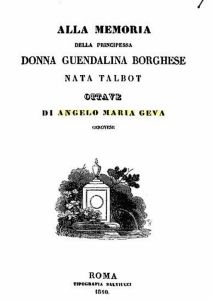Poet and man of letters
 Angelo Maria Geva was born in Sanremo on 16th December 1809 from Francesco and his second wife Angela Maria Torre.
Angelo Maria Geva was born in Sanremo on 16th December 1809 from Francesco and his second wife Angela Maria Torre.
He began his studies at the college of Sanremo and was later taken by his mother to Rome where he met some people from Sanremo: Vincenzo Modena, his father Giuseppe Carli from the company of Jesus and his father Borgogno from Somalia. These, to which Monsignor Stefano Rossi della Colla was added, not only bonded with each other with friendly ties but also to cultivate literary studies by commenting on the classics. Soon the Geva acquired fame in the literary field and became a member of the Accademia Tiberina.
Prince Borghese wanted him as his special secretary. He could have obtained the chair of Italian literature at the University of Rome if his political ideas had not damaged him. He was in fact a fervent Mazzinian so much so that he was often seen crowding the people in the squares. This led to the fact that as soon as Pius IX returned from Gaeta he had to leave Rome for Genoa where he wrote the "Apostolic Refugee" and then returned to Sanremo to his sister Teresa. During his stay in Sanremo he worked hard on the translation of the Aeneid which earned him an annual pension of 300 lire from the king.
In 1857 he followed his sister Teresa to Constantinople where she joined her husband, the ship-owner Filippo Pesante, who had settled there after the Crimean War and obtained there a chair of letters. During the last years of his life spent in Constantinople the Geva dedicated himself not only to teaching but also to transcribing his numerous translations and when he had accomplished what he believed to be his task, his relatives heard him exclaim "maintenant, je peux mourir heureux".
On 21st November 1863 he died in Sanremo.
The municipal administration dedicated him a road in the hamlet of Bussana from Via Veneto to Via Marsala.




